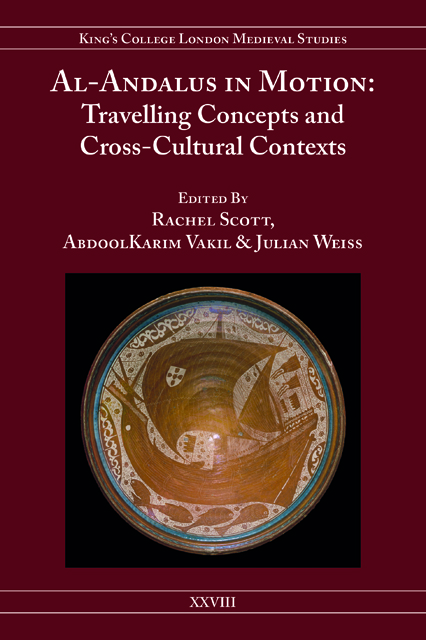Book contents
- Frontmatter
- Contents
- List of Illustrations
- Acknowledgements
- Notes on Contributors
- Part I Departure Points
- Part II Translating Al-Andalus: Travelling across Languages
- Part III (Re)Visions of Al-Andalus in Diaspora and Exile
- Part IV Andalusi Space as Node and Utopia: Europe, Islam, Empire
- Part V Al-Andalus and the Politics of Religious Identity
- Part VI Legacies, Landscapes and ‘Travel Buildings’
- Epilogue
- Index
3 - The Return of an Andalusi Moment: Sephardi Alternatives to the Monolingual Imagination, Pre- and Post-Partitioned Palestine
Published online by Cambridge University Press: 02 June 2023
- Frontmatter
- Contents
- List of Illustrations
- Acknowledgements
- Notes on Contributors
- Part I Departure Points
- Part II Translating Al-Andalus: Travelling across Languages
- Part III (Re)Visions of Al-Andalus in Diaspora and Exile
- Part IV Andalusi Space as Node and Utopia: Europe, Islam, Empire
- Part V Al-Andalus and the Politics of Religious Identity
- Part VI Legacies, Landscapes and ‘Travel Buildings’
- Epilogue
- Index
Summary
How can we write Sephardi/Arab-Jewish intellectual history in a post-partitioned era? How can we reimagine its historical and geographical scope after more than a century of physical, social, cultural and political displacements, marginalisation and negation within Palestine/Israel? And by ‘post-partition’ I refer not only to the partition of Palestine/Israel in 1948 but also to separations of disciplines, traditions, histories and languages: between Hebrew and Arabic literature, between Judaism and Islam, Zionism and Arab nationalism, Jewishness and Arabness, and between Sepharad and al-Andalus.
In this post-partitioned environment it is not surprising that boundaries become such a crucial issue in research into modern Sephardi/Arab-Jewish cultural history. The research field's boundary lines, in terms of language, temporality, space and place, are far from clear. What, for instance, is the linguistic scope: literary Arabic, Hebrew, Judeo-Arabic, Ladino, Spanish, French or English? Is it a division of a larger Jewish history or literary field, or should it be considered as part of Hebrew, Arabic, Middle Eastern, Spanish or postcolonial literary frameworks? Can we explore and understand the Sephardi intellectual world through the existing fragmented academic disciplines and terminology? Can we transcend geographical, historical and disciplinary boundaries and reorganise and reconnect the fragmented pieces within a cross-disciplinary framework? Most scholarship today navigates within a narrow and limited scope, adapting itself into a post-partitioned, fragmented academic landscape and political reality. In light of this, there is a need for new methods which recognise but go beyond current geographical, historical and disciplinary boundaries to explore Sephardi/Arab-Jewish/Mizrahi history in its fullness and complexity.
Moreover, which term should we use to define the collective entity or identity which lies at the centre of this research field? Sephardi Jews, Arab-Jews, Mizrahim, Ottoman Jews or maybe Middle Eastern Jews? What kind of historical, lingual, geographical and political sets of issues are encoded in each term? No single name or term seems to fully represent a unified entity. The terms used here – Sephardi Jews, Arab-Jews, Mizrahim – overlap and are slippery; they also refer to internally diverse groups and carry different epistemological, historical and disciplinary baggage (Shohat 2001; Stein 2002: esp. 330–33, 337; Shenhav and Hever 2012).
- Type
- Chapter
- Information
- Al-Andalus in MotionTravelling Concepts and Cross-Cultural Contexts, pp. 81 - 104Publisher: Boydell & BrewerPrint publication year: 2021



